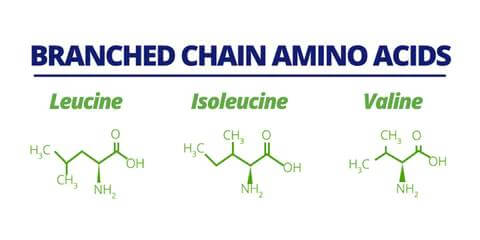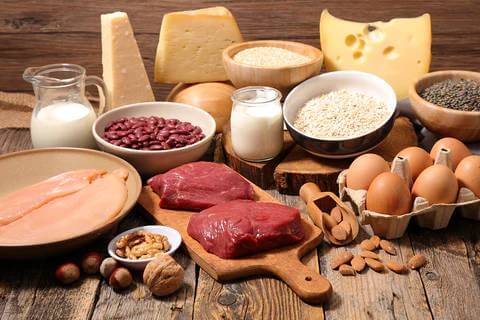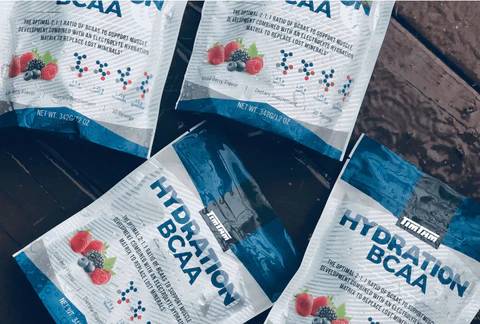BCAAs, or Branched-Chain Amino Acids, have gained popularity throughout the fitness and performance industry in recent years. But what are they? What do they do? How can they help you reach your goals? We are focused on providing our audience with the most up to date information to help reach their fitness and performance goals. First, let’s take a look at the basics!
What are BCAAs?
Protein is responsible for many functions in the human body including: building and repairing bodily tissues, metabolism, coordination of bodily functions, maintaining pH, and much more. There are 20 amino acids, which are the building blocks of protein, divided into two categories: 9 essential and 11 nonessential. Essential amino acids (EAAs) earn their name as they are essential to the human diet, due the body’s inability to produce them. Conversely, the 11 nonessential amino acids are naturally produced by the body and are not crucial components of a ‘complete’ protein.

BCAAs, or branched-chain amino acids, are 3 of the essential amino acids: leucine, isoleucine and valine. The name is derived from their ‘branched-chain’ structure, distinguishing them from the other EAAs.
Incorporating in your diet
BCAAs can be found in many of the protein sources in a traditional diet. Considering they are 3 of the 9 essential amino acids that make up a ‘complete’ protein, you can expect to be getting at least some BCAAs through protein intake already. However, BCAAs in each protein source vary in content. Here are some common examples:¹
- Beef, round - 3.5 ounces - 6.8 grams of BCAAs
- Chicken Breast - 3.5 ounces - 5.9 grams of BCAAs
- Salmon - 3.5 ounces - 4.9 grams of BCAAs
- Turkey Breast - 3.5 ounces - 4.6 grams of BCAAs
- Eggs - 2 eggs - 3.3 grams of BCAAs
- 1% milk - 1 cup - 2.2 grams of BCAAs
- Greek Yogurt - ½ cup - 2 grams of BCAAs

Benefits
The function of BCAAs in muscle protein synthesis -- building and repairing the muscle -- and energy regulation is the reason why many athletes opt for supplementation around training. They are believed to aid in building and maintaining muscle, endurance, fat reduction, and speeding up muscle recovery. Let’s take a look at the facts.
Muscle Recovery and Performance
Studies suggest that BCAA supplementation around training may provide a greater availability in the body, therefore replenishing the muscle with necessary nutrients to repair, recover, and grow.²
- A 2019 study analyzed data from 42 articles and came to the conclusion that BCAA supplementation yielded significant improvement in delayed onset muscle soreness (DOMS) compared to a placebo.³
- A 2020 study found that individuals who took BCAAs prior to a graded exercise test had lower perceived exhaustion and performed longer than the placebo group.⁴ They concluded, along with other studies, that BCAA intake reduces serotonin concentration, which is associated with the delay in central fatigue.⁴ ⁵ ⁶
The results are promising in that they reveal the effectiveness of BCAA supplementation on performance and recovery. However, other studies cannot be ignored suggesting that supplementation, in addition to optimal protein intake, will not increase or speed the benefits in the body when there is already sufficient BCAA intake.⁷ ⁸
Fat Reduction
Many use BCAA supplementation to help reach their weight loss goals. This comes from the belief that BCAAs act as a ‘fat burner’ when you add them into your diet. There is some truth to that statement, however not in the way many may think.
To put it simply, a body that uses more energy per day than it takes in (calorie deficit) loses weight; while the opposite is true when the body uses less energy per day than it takes in (calorie surplus). Throughout the day and during physical activity the body uses energy from nutrients in our diets and our bodies’ stores. When available glucose -- the body’s main source of energy -- is depleted, the body can break down muscle protein and fat stores for energy. The breakdown of muscle and fat stores are simultaneous and fluctuate in response to different activities, however some studies show that BCAA intake will help preserve lean muscle tissue while the breakdown of fat continues to occur.⁹ ¹⁰ ¹¹ ¹² ¹³
Other research, however, was not designed to keep overall calorie intake consistent between groups.¹³ ¹⁴ Therefore, these comparisons suggest that BCAAs may not directly cause increased fat metabolism, but instead, help preserve lean muscle during weight loss, as a result of a calorie deficit.⁹ Although there is still much needed research to come to this conclusion, 2011 data involving overweight and obese individuals found that BCAAs may help improve glucose tolerance. Impaired glucose tolerance is suggested to be a cause of obesity.¹⁵
Ultimately, a direct link between BCAA intake and fat loss has yet to be discovered. What we do know is that weight loss occurs due to a caloric deficit and evidence shows that BCAAs help to preserve muscle tissue during a catabolic state when the body may be burning calories from fat and muscle. Overall, those two factors are a positive result in terms of improving body composition.

Who should use BCAAs?
In short... everyone. Whichever way you choose to interpret the data, BCAAs are still an essential part of the human diet. That being said, BCAA supplementation should be treated as you would treat any supplement; to fill in nutritional gaps. We know they play a crucial role in the body, however there is little to suggest that excessive amounts are better. If you are on a calorie restricted diet, vegan, or simply not getting enough protein, then supplementing with BCAAs may be a great option to keep your body running optimally and aid in reaching your fitness and performance goals. BCAAs are rated high for safety, and they are even used to help prevent protein breakdown in patients with liver damage, cancer, sepsis and other diseases.¹⁶ If you are unsure, it is recommended that you consult your doctor to make sure supplementing with BCAAs is safe for you.
Timing and amount
First off, as with most things, consistency breeds results. Just as an erratic sleep schedule, daily routine, and training regimen can lead to different results; so can BCAA supplementation. A healthy diet should be consistent and balanced, daily, to keep the body running at its best every day. So why should it be any different when it comes to your supplementation if that’s how you keep that balance?
Additionally, a key component that separates many successful from unsuccessful studies are groups that consistently used the BCAAs.⁷ Two publications even mentioned the key role that dosage, timing, and duration played in results.¹⁷ ¹⁸ Individuals are recommended to supplement with 7-20 grams of BCAAs, in contribution to your total per day from other food sources. Our interpretation is that it is best to take them before or during exercise on training days for optimal results. Sipping them throughout recovery days can also help replenish and repair your muscles.² ³ ⁴ It’s also a way to stay hydrated with added flavor and without all the extra sugar.

Takeaway
Whether your goal is to improve performance and recovery, or maintain muscle while on a calorie restricted diet, BCAAs can be a useful tool to help you reach your goals.² ³ ⁴ ¹⁹ Despite the controversy, we see the results and the role they play in the body. BCAAs are safe to take in moderation and are increasingly gaining evidence supporting their contribution in muscle performance, recovery, and overall body composition. Make sure you are using them as a supplement, not a substitute, for a healthy diet. It is important to understand that gaining or losing weight, in terms of muscle and fat, is primarily manipulated by ‘energy-in’ and ‘energy-out’. BCAAs help to optimize the body in order to reach and maintain a goal, secondary to proper training and nutrition.
Remember that not all BCAAs are created equal.
- A BCAA ratio of 2:1:1 is considered the ‘gold standard’ and coincides with most clinical studies to date.
- Be aware of unhealthy additives, chemicals, and poor-quality ingredients found in various brands.
For an all-natural and superior quality, try Hydration BCAA by TimTam.


